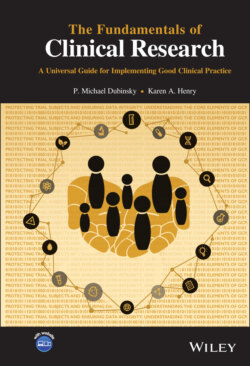Читать книгу The Fundamentals of Clinical Research - P. Michael Dubinsky - Страница 68
5.4 Interacting with Regulatory/Competent Authorities
ОглавлениеThere are a number of mechanisms utilized to communicate with regulatory authorities and while none are unique to drug development it is useful to reflect on them and on the manner, in which they are arranged, documented and records maintained. As mentioned earlier communications will occur through one of three means – electronic means such as videoconferencing or telephone; face‐to‐face in a meeting or in a written submission. E‐mail would be considered as a written submission. The choice of which mechanism to use may take into consideration a number of factors. Factors such as the stage of development, the nature of the investigational product (IP), the circumstances prompting the need to communicate and the wishes of management can all be important forces when it comes to deciding which approach to choose. From the standpoint of GCP the sponsor is expected to establish and maintain the set of essential documents which represent the evidence that the trial was conducted in conformance with GCP and the applicable regulatory requirements. Records are kept by all the players in the clinical trial process, e.g. investigator, IRB, but the sponsor is responsible for the trial master file (TMF). The TMF is that central repository where the entire set of trial related documentation is maintained. Whether the records are hard copy or electronic the sponsor’s regulatory affairs unit is generally in charge of those records being organized and up to date if and when needed. If you refer to Chapter 29 Essential Documents – the TMF is discussed in detail. It is worth mentioning, and we will several times in the text that the documents which populate the TMF represent the evidence that the trial was conducted in compliance with GCP.
Regulatory authorities have established ground rules for official communications and they live by those rules. For example the US FDA’s Center for Drug Evaluation and Review has procedures defining types of meetings they will arrange with sponsors in terms of timing, topic, pre‐meeting documentation, etc. [2] A trial sponsor should not expect to just send an E‐mail or make a telephone call to arrange a meeting. Regulatory authorities have just so many people resources and those resources have a range of responsibilities, so requests for meetings are controlled closely.
Even with the complexities that accompany arranging a meeting they are an excellent framework for ensuring that the parties are on the same page about key aspects of the trial, such as the IP, the objectives, the entire nature, and scope of the endeavor. It is important for the sponsor to be certain their records of any meetings are as complete and clear as possible about any agreements, disagreements, and commitments made by the sponsor or the competent authority. Such factors play into the GCP arena in sometimes unexpected ways. For example if the sponsor makes commitments about the approach to monitoring, training or IP handling during meetings with the competent authority during a meeting prior to a Phase commencing and it is determined later that commitment was not kept it may prove very problematic. Such commitments actually become an element of GCP for the trial even if they are not specifically mentioned in the ICH E6(R2). It should be kept in perspective that GCP like the other GXP requirements are a baseline set of minimum requirements. Sponsors must meet the baseline requirements but the manner in which they implement them is usually left to the sponsor, IRB or site.
Applications for permission to initiate a clinical trial, e.g. IND or CTA, along with their amendments and supplements also bind the sponsor and other trial players to aspects of GCP. Competent authorities as part of their codified rules take the time to describe the expectations that are in place for sponsors, investigators, IRBs, and in some ways even subjects. Sponsors commit in writing to ensure compliance with all applicable requirements. If those commitments are not honored there are severe penalties which may be imposed. So compliance with GCP must become a cultural force in the entire scheme of conducting a clinical trial.
